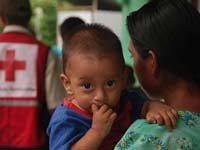Honduras
 Honduras is one of the poorest countries in Latin America and ranks 121st out of 187 on the United Nations Development Programme’s Human Development Index. Although in recent years economic growth has been as high as 7% per year – one of the highest growth rates in Latin America - the financial crisis and the June 2009 coup d’état slowed the export-based economy. Furthermore, 50% of the population lives below the poverty line and unemployment is at 28%. Deforestation and export of crops contribute to malnutrition, especially in rural areas.
Honduras is one of the poorest countries in Latin America and ranks 121st out of 187 on the United Nations Development Programme’s Human Development Index. Although in recent years economic growth has been as high as 7% per year – one of the highest growth rates in Latin America - the financial crisis and the June 2009 coup d’état slowed the export-based economy. Furthermore, 50% of the population lives below the poverty line and unemployment is at 28%. Deforestation and export of crops contribute to malnutrition, especially in rural areas.
The Canadian Red Cross began its work in Honduras in 2000 following hurricane Mitch. In partnership with the Honduran Red Cross, the Canadian Red Cross is committed to improving the lives of vulnerable people living in some of the poorest and most isolated regions of the country. The Red Cross offers maternal, newborn and child health as well as disaster management and risk reduction projects in Honduras.

Maternal, Newborn and Child Health
In 2006, the Canadian Red Cross, the Honduran Red Cross and the Honduran Ministry of Health implemented a six year maternal, newborn and child health project called “Redes” or Networks in English. The aim of this project was to improve the health of children under five and women of reproductive age to decrease maternal, perinatal and infant morbidity and mortality, in rural communities. This project was made possible with the financial support of the Government of Canada through the Canadian International Development Agency (CIDA) and the Pindoff Millennium Trust.
The REDES project promoted healthy behaviours, community empowerment, institutional capacity building, and effective health interventions. It also provided primary health services to 229 under-served, rural communities in Northwestern Honduras. The project strengthened networks for community health and promoted planning and coordinated efforts between communities, health services, municipal and local governing bodies, and Red Cross regional branches.
Red Cross staff and volunteers educated mothers on nutrition, teaching families about what foods are appropriate for their child at various ages. They were also taught about the diversification of local food and how to plant home gardens. In addition to nutrition, mothers learned to identify danger signs of childhood illness and necessary prevention and treatment. Pregnant mothers were asked to visit a doctor once a month for prenatal controls and provided with information to recognize warning signs of problems with pregnancies and after childbirth.
Red Cross, along with the local Ministry of Health, promotes that families and communities take responsibility for their healthcare. In Honduras, men do not traditionally participate in health-related decisions in their households. Through the project’s efforts to promote men’s active role in health, men are becoming part of the solution toward preventing maternal and childhood mortality.
Disaster Management and Risk Reduction
The Canadian Red Cross is partnering with the Honduran Red Cross in the implementation of the “First Responder Initiative,” made possible by the financial support of the Government of Canada through the Canadian International Development Agency (CIDA). This three year initiative began in 2010. Its purpose is to position the Honduran Red Cross as a national and regional leader in emergency response and as an effective auxiliary to the Nicaraguan government’s disaster risk management systems at national, regional and local levels.
Working in close coordination with the International Federation of Red Cross and Red Crescent Societies (IFRC) and other Red Cross societies in the region, the Canadian Red Cross supports the Honduran Red Cross in strengthening its ability to prepare for, respond to and recover from disasters. This includes the development of policies and systems, emergency management centres, standard operating procedures and contingency planning, logistics systems for equipment and supplies and the training of first responders. The project also strengthens the Honduran Red Cross’ community-based disaster risk reduction programming through training and community mobilization for disaster preparedness and response.
